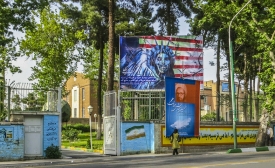united states
2017 has become the year when absurd jokes appear to be coming true. When Dennis Rodman made his first trip to North Korea back in 2013, it was amusing to imagine the eccentric NBA legend acting as the United States’ de facto ambassador to the country. [...] In an interview with Good Morning Britain, the five-time NBA champion offered to “straighten things out” between Trump and North Korea’s Kim Jong-un, emphasizing that he considers both men friends.
According to reports from the Brazilian Army’s Social Communication Center (CCOMSEx), CBEMs are military diplomacy tools for the alliance between partner nations. “International understandings and commitments support the geopolitical needs of both countries’ interests,” CCOMSEx explained to Diálogo. [...] “Brazilian and U.S. service personnel can expand partnerships for exchanging defense products from both armies and for planning and executing maneuvers in the areas of logistics, intelligence, communications, cybernetics, and command and control,” said CCOMSEx.
An embattled anti-propaganda unit intended to combat Russian and Islamic State militant group (ISIS) misinformation is losing key staff even after Secretary of State Rex Tillerson began to fund the program at the urging of Congress. Nash Borges, chief technology officer at the anti-propaganda Global Engagement Center’s (GEC), left the unit last Friday according to Defense One, which obtained a copy of his final email to staff.

Olga Krasnyak delves into embassy tensions and public response, per the recent strife between Russian and U.S. diplomatic residences.
On September 2, 2017, U.S. authorities seized the buildings of the General Consulate of the Russian Federation in San Francisco and the Russian Trade Mission in Washington, D.C. Simultaneously, Russian representatives were denied access to the rented premises of the Russian Trade Mission in New York...Despite emotional coloring and personification, this situation suggests a “tit for tat” of diplomatic expulsions. The diplomats of both countries should know where to draw the line.
Kota Kinabalu: The United States Embassy in Kuala Lumpur continued its music diplomacy by bringing in one of America's hottest rock bands – ASIDIC - to entertain music lovers at the Black Box venue at Suria Sabah on Friday. "The U.S. budget is a matter decided by Congress and the State Department and we hope to continue this next year as this is an investment in people (ties)," a spokesman said, when asked if such concerts would fall victim to new President Donald Trump's cost-cutting.
As World War II ended, America faced another challenge: the Cold War with the USSR and the Eastern Bloc it influenced. As relations began to freeze, it became clear that nuclear weapons, spies, and the traditional tools of war wouldn’t be enough to fight Soviet hegemony. And so the West, argues Greg Barnhisel, turned to their secret weapon: books.
Though Mexico and the U.S. may not have had the most amicable relationship throughout history, one positive cultural phenomenon that came out of their contentious relationship was the emergence of modern Mexican art. The upcoming exhibition “Mexico Modern: Art, Commerce, and Cultural Exchange, 1920–1945” at The University of Texas at Austin not only reveals the cultural exchange between Mexico and the U.S, but also exhibits how Mexican art and design gained international attention.







